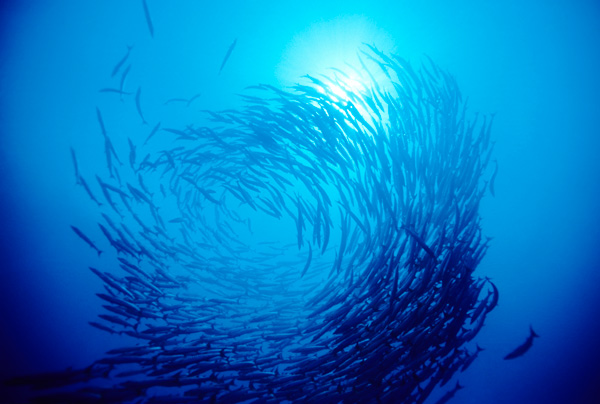
Climate change will by the middle of this century force the displacement of marine species from tropical to mid and high latitudes, according to a report issued by the Intergovernmental Panel on Climate Change (IPCC) today (Monday 31 March 2014).
Such a widespread redistribution would have implications for food security, with a projected decline of up to 60 percent in fisheries yield in the tropics.
The Summary for Policymakers prepared by the IPCC's Working Group II, which includes Professor Philip Boyd of the University of Tasmania's Institute for Marine and Antarctic Studies as a lead author, was released in Yokohama, Japan, this morning.
The Working Group II's contribution to the Fifth Assessment Report considers the vulnerability and exposure of human and natural systems, the observed impacts and future risks of climate change, and the potential for and limits to adaptation. Australia and New Zealand, Polar Regions and Small Islands are among eight areas of focus.
The group's findings are variously calibrated as 'virtually certain', 'very high confidence', 'high confidence', 'medium confidence', 'low confidence', 'limited evidence' or 'low agreement'.
"After 48 months of deliberations, the Working Group II has concluded that it is virtually certain that ocean ecosystems are responding to climate change at different rates, magnitudes and durations," Prof Boyd, an internationally renowned expert in environmental controls on marine productivity from IMAS' Marine and Antarctic Futures Centre, said today.
"We can say with very high confidence that climate change is altering the physical, chemical and biological properties of the oceans which cover 71 per cent of the Earth's surface."
Oceanic drivers including salinity, circulation, temperature, carbon dioxide, oxygen, nutrients, and light are shaping the physiological performance of individual cells and organisms. These drivers will ultimately set the composition, spatial structure and functioning of marine ecosystems.
"We say with medium conference that one manifestation of global warming is a reduction in the maximum body size of marine species, and with high confidence that this has an impact on interactions between species, including competition and predator-prey dynamics," Prof Boyd said.
"The distribution and abundance of many fishes and invertebrates have shifted poleward and/or to deeper, cooler waters.
"Displacements of marine animals by the mid-21st century are projected to cause high-latitude invasions and high local-extinction rates in the tropics and semi-enclosed areas."
Addressing his own specialist field, Prof Boyd stated that the Working Group had concluded with 'high confidence' that ocean acidification would affect marine ecosystems for centuries if human-made emissions continue. Highly calcified coral communities were particularly vulnerable.
"Shell thinning in plankton is another example of the negative impact of acid acidification – the thinning has been attributed fully or in part to acidification."
Local adaptation measures such as conservation or a reduction in human activities such as fishing may not be sufficient to offset the global effects of climate change on marine ecosystems, the Working Group declared, with 'high confidence'.
The Deputy Vice-Chancellor (Research), Professor Paddy Nixon, saluted the input of Prof Boyd into the report.
"Given that Antarctic, marine and maritime research is one of the University of Tasmania's five major themes it is not surprising that we are well represented among the ranks of globally recognised academics contributing to the IPCC's three working groups.
"In addition to Prof Boyd, another significant Tasmanian contributor has been Prof Nathan Bindoff, who is affiliated with IMAS, the Antarctic Climate and Ecosystems CRC and CSIRO, and is one of the few scientists to have been a coordinating lead author twice."
For further information on the Working Group II Summary for Policymakers, please visit: http://www.ipcc.ch/